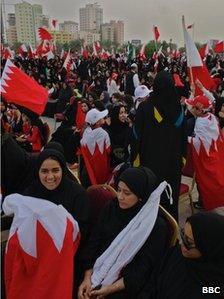Bahrain Sunni-Shia split manifests itself in mistrust
- Published

Supporters of Bahrain's Sunni government fear the influence of Shia Iran
Anti-government protests in Bahrain were suppressed last year with the help of Saudi Arabia, but the tensions between the Sunni leadership and the Shia majority population are never far below the surface. The BBC's Bill Law has been to a mosque in the Bahraini capital Manama to get behind the continuing sectarian split.
Waving Bahraini and Saudi flags, a crowd estimated at 3,000 gathered at the central Sunni mosque in Manama.
The rally heard fiery speeches in defence of King Hamad and his government.
Many of those present told the BBC that Iran was behind the ongoing disturbances in the Gulf island kingdom.
Bahrain has a majority Shia Muslim population, but the ruling al-Khalifa family is Sunni. The Shia have long complained of discrimination at the hands of the Khalifa rulers.
Fears of Iran
People in the crowd repeatedly told the BBC that anti-government protesters were being controlled by Iran.
As speakers denounced the main Shia opposition party al-Wefaq, one government supporter said, "Al-Wefaq does not represent the people of Bahrain. We are the real voice of the people. Wefaq is the voice of Iran."
But Wefaq's senior leader, Sheikh Ali Salman, denied any connection between the party and Iran. When asked by the BBC if there was any truth to the charge, he flatly denied it.
"We have no connection with Iran," he insisted. "We are not calling for the overthrow of the royal family. We want reform."
He said Wefaq was willing to undertake "meaningful dialogue" with the government in a bid to end ongoing unrest.
But the government, he said, did not want meaningful dialogue.
"They talk about it. They don't mean it."
He insisted that Wefaq, though it might be a predominately Shia party, was open to all who believe in freedom and forging a road to democracy.
Still, many Sunni believe if not Wefaq, then either Iran or Hezbollah is behind the nightly rioting in Shia villages and the demands of the opposition.
As one man at the pro-government rally told me, "The Shia are controlled by Iran. They do exactly what Iran tells them to do. 100% of the Shia are behind Iran."
Symbol of defiance
Human rights activists say that the Iran charge is simply a smokescreen.
"This is just another way for the government to try and deny the legitimate demands of the people," argues veteran democracy campaigner Nabeel Rajab.
He says he will lead a march to reclaim Pearl roundabout on 14 February, one year after it was peacefully occupied by demonstrators in the wake of the Egyptian revolution.
The roundabout, which has become a symbol of defiance, was forcibly cleared on 17 February last year. Protesters took it back but were finally routed in March when Saudi and other Gulf Co-operation Council troops entered the country to help quell the uprising.
Hundreds were arrested, dozens died and several thousand were sacked from their jobs. The vast majority were Shia.
An attempt by the king to pacify the opposition and temper worldwide criticism with an independent commission made up of international human rights experts has done little to ease tensions.
The report confirmed excessive use of force by police and the systematic torture of detainees.
In its wake, King Hamad has introduced constitutional reform, ordered the reinstatement of those who lost their jobs, and vowed to rein in the police.
But the opposition says that the security forces continue to act with impunity. And they say that though many have been brought back to work, the terms of re-employment are discriminatory and do not acknowledge that the dismissals were unfair and sectarian.
As divisions grow ever wider in the country, and as nightly rioting continues in Shia villages outside the capital, the hope of a fair and peaceful solution seems vanishingly small.